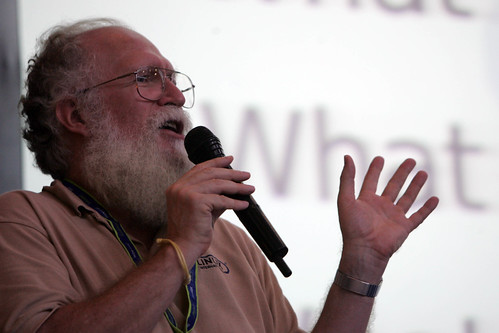Ten days ago OOXML vote in ISO/IEC JTC1 failed, as results clearly by the official ISO announcement.
Approval requires at least 2/3 (i.e. 66.66 %) of the votes cast by national bodies participating in ISO/IEC JTC 1 to be positive; and no more than 1/4 (i.e. 25 %) of the total number of national body votes cast negative. Neither of these criteria were achieved, with 53 % of votes cast by national bodies participating in ISO/IEC JTC 1 being positive and 26 % of national votes cast being negative.
Since this vote is not the end of the process, that will go until February when another JTC-1 meeting in Geneva will take place, I posed some questions to Andrea Valboni, Italian Microsoft’s CTO (read the disclosure).
 Lighting from fingertips would be a plus, by urbanbohemian
Lighting from fingertips would be a plus, by urbanbohemian
Despite many O countries voted yes, only half of P members were favorable, why that in your opinion?
The fast track process for DIS29500 [name for ECMA OpenXML] has catalyzed the interest of many NBs around the world, and this is a counter-proof of the importance that many countries sees in this fact. As a consequence the debate around this technical specification has been very healthy and the numbers of countries participating to the five months discussion has been fairly higher with respect to the approval of ISO26300. As expected, P members has been affected by an intense lobbying activity by both sides and some of them felt that the only way to have their technical comments being considered by ISO was to express a “conditional approval”, which means a disapprove vote that could change to an approve if the issues reported as comments will be addressed.
Passing from 30 full voting members to 41 in six months could be a sign of democracy in action, but participating ISO processes it is far to be open, since you have to pay about 2000 euros.
As Kretchmer clearly stated years ago, among the ten requirements that enable Open Standards Open Meeting is the first of the list. But the very first barrier for stakeholders to participation in the standardization process is just the economic one. Paying to become a member IS a barrier.
About “the right” to stack a committee, while I have not been asked by Microsoft to join the ISO/IEC JTC1, I have been contacted by representatives of the opponent tribe who kindly offered me to pay my fee.
Despite I am pretty sure that Andy Updegrove is right saying
That vote was marred by accusations in many countries around the world of overly aggressive conduct upon the part of Microsoft alleges, but has not substantiated, similar charges against opponents of OOXML.
I believe that sooner or later similar charges against opponents will come out.
Getting back to OOXML Frederic Couchet, spokesman for APRIL, said that:
The OOXML format contains significant design flaws [and it will be difficult to correct them] other than by starting again from scratch, or by enriching the already existing standard, Open Document Format.
Do you think that Microsoft would be able to propose modifications at the next ballot resolution meeting to make national bodies wish to withdraw their negative votes?
Standards exists in ISO addressing the same topic area, like networking or multimedia representation, all of them come from a different story and user requirements. The same applies to document’s representation, where ISO26300 coexists with ISO19005 (PDF/A) and DIS 29500 is just a different way to represent unstructured information, which reflect a different perspective on how information can be handled. Is it technically better than ISO26300? It is difficult to judge, only time can prove this and ISVs acceptance. We never criticized ISO26300 for technical imperfections; there are, of course, as in any technical specification, but this is not the main point: the two are just different. ECMA TC45 who worked on OOXML contributed significantly in improving the technical specifications, with about additional 2000 pages which added to the original 4000; we think the work of those people, coming from 12 different companies, should be respected and not simply stamp it as “significantly flawed”. The increasing numbers of developers and companies who are building solutions on this technical spec demonstrate that the standard is usable and not that flowed.
As part of ECMA, Microsoft will provide its support in addressing the technical comments presented by different countries, but is ultimately ECMA job to provide satisfactory proposals to resolve objections. As far as our role in the national organization, UNINFO, we agreed on the proposal presented by Leonardo Chiariglione during the discussion period, to support the development of a reference implementation and testing procedures for DIS29500, to be released according to an open source model, in order to facilitate the adoption of the standard. This proposal is attached as a comment to the Italian voting position and we confirm our commitment in supporting this proposal within the ISO organization.
I believe that the Association PLIO, who is actively participating the standardization process, would be interested to further investigate such opportunity.
Thanks for your answers and.. happy hacking! 😉
Full disclosure.
In different time, I had some collaboration with Microsoft, since they need to better understand the free software principles and the business model and to validate their thoughts on how to find ways to cooperate with the free and open source world on interoperability, licensing schemas and possibly joint initiatives.
Technorati Tags: File Format, OpenXML, JTC1, AndreaValboni, AndyUpdregrove, FredericCouchet, APRIL, PLIO, OpenOffice

 Jon Hall Maddog by
Jon Hall Maddog by  Prevent..by
Prevent..by  Lighting from fingertips would be a plus, by
Lighting from fingertips would be a plus, by  now hiring, by
now hiring, by
Reply